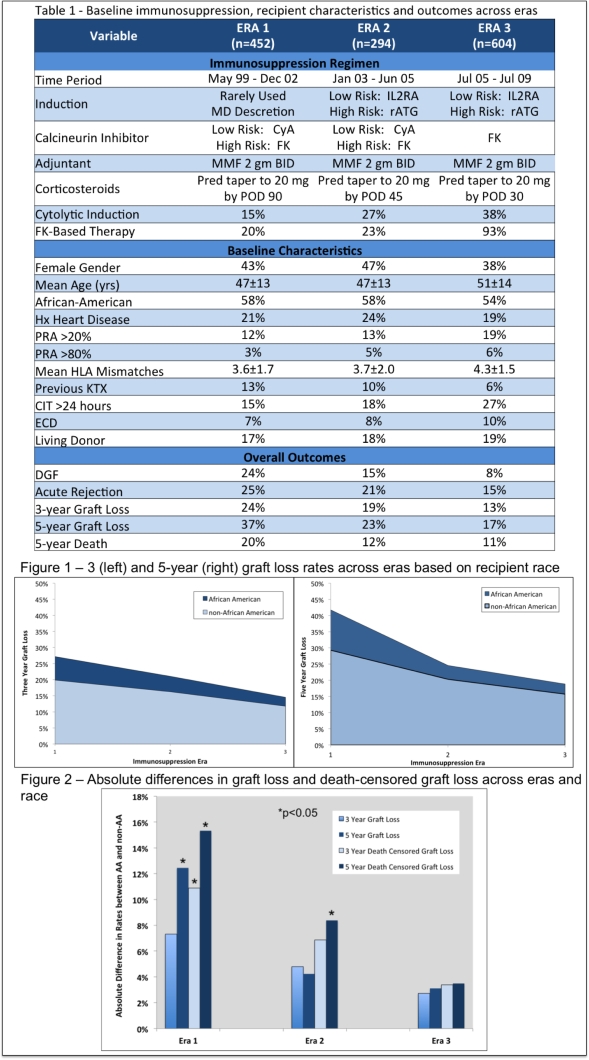Attenuating Racial Disparities in Kidney Transplantation Through the Use of Potent Immunosuppression Regimens
Medical University of South Carolina, Charleston, SC.
Meeting: 2015 American Transplant Congress
Abstract number: D57
Keywords: African-American, Graft failure, Kidney transplantation
Session Information
Session Name: Poster Session D: Disparities in Healthcare Outcomes
Session Type: Poster Session
Date: Tuesday, May 5, 2015
Session Time: 5:30pm-6:30pm
 Presentation Time: 5:30pm-6:30pm
Presentation Time: 5:30pm-6:30pm
Location: Exhibit Hall E
African-American (AA) kidney transplant (KTX) recipients have higher rates of graft loss, which may be partially attributed to higher immunologic risk. The aim of this study was to determine the impact of evolving immunosuppression regimens on racial disparities in KTX.
Methods: Retrospective longitudinal cohort study of adult solitary KTX from a single-center. Cohorts were assigned based on immunosuppression protocol evolution (top of Table 1) and outcomes compared between AAs and non-AAs for absolute differences in 3 and 5-year graft survival. All patients had follow-up for at least 5-years or until death. Logistic regression were used for mutlivariable modeling.
Results: 1,350 patients were included (756 AA, 594 non-AA). Immunosuppression regimens evolved between era 1 and 2 to include increased use of cytolytic induction therapy for high risk patients and evolved between era 2 and 3 to include FK-based therapy. Graft loss rates at 3 and 5-years decreased across eras for all patients, but to a greater degree in AA recipients (Figure 2). This resulted in a significant reduction in racial disparities for 3 and 5-year graft loss, particularly for death-censored events (Figure 3). Multivariate modeling, controlling for differences across era, demonstrated that era accounted for a 19.7% relative reduction in racial disparities for 3-year graft loss and a 20.7% relative reduction for 5-year graft loss.
Conclusion: AA KTX recipients continue to experience higher rates of graft loss, most notably after 3-years post-transplant. However, the increased use of potent immunosuppression regimens (cytolytic induction and FK) has likely attenuated this disparity.

To cite this abstract in AMA style:
Taber D, Gebregziabher M, Pilch N, Srinivas T, Chavin K, Baliga P, Egede L. Attenuating Racial Disparities in Kidney Transplantation Through the Use of Potent Immunosuppression Regimens [abstract]. Am J Transplant. 2015; 15 (suppl 3). https://atcmeetingabstracts.com/abstract/attenuating-racial-disparities-in-kidney-transplantation-through-the-use-of-potent-immunosuppression-regimens/. Accessed February 17, 2026.« Back to 2015 American Transplant Congress
